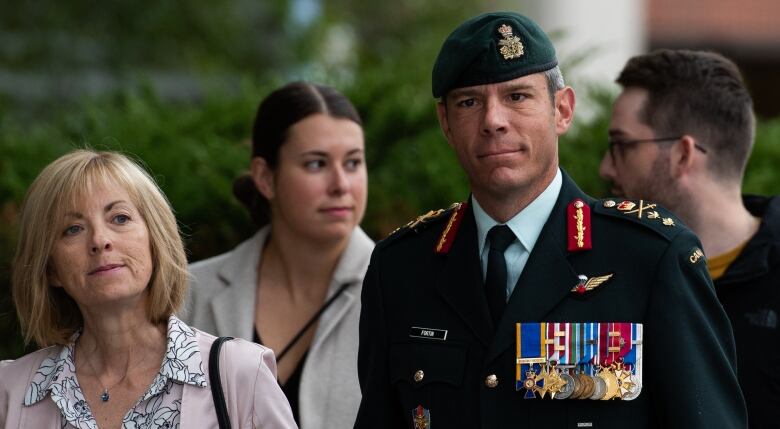Military to decide whether members accused of crimes can wear uniforms in civilian courts
Victims' advocates say use of military dress in court by accused amounts to intimidation, bullying
Canada's military is reviewing its dress code policy for civilian court cases in response to online outrage overa highly-decorated military commander's recent decision to wearhis uniform and medals to his sexual assault trial.
Maj.-Gen. Dany Fortin, the former head of Canada's vaccine task force, has beencharged with sexual assault in relation to an alleged incident in 1988. He has pleaded not guilty.He defended himself in a Quebec civilian courthouse earlier this week dressed in his uniform, with10 medals across his chest.
Fortin and his lawyer have said they will notcommenton any matters during thetrial. A spokesperson for Fortin, who did not want to be named due to concernsabout online reprisals, saidthat Fortin is presumed innocent andit'sappropriate for him, as a serving officer, to wear his uniform in court.
The Department of National Defence (DND) said military members are permitted to wear their uniforms during civilian criminal trials but it's a "personal choice for which individuals are responsible."

DND also said the militarywill now "examine its policies related to the participation of CAF members in civilian judicial proceedings, including the subject of military dress, to assess whether changes should be made."
The civilian judicial system prosecutes a series of offences involving military members, including murder, manslaughter and sexual assault.
Several military sexual trauma advocates have saidthat the act of wearing the full uniform to court while on trial for sexual assaultis a power play that intimidatescomplainants and triggersvictims.
Retired major Donna Riguidelsaid she wants the military to ban its members from wearing their uniforms in court while on trial or to at least advise against it.
"At best, it's tone-deaf," said Riguidel, the director of Survivor Perspectives Consulting Group. "At worst it's intimidation and bullying and it will have a silencing effect on survivors."
Riguidelhasbeen hiredby the military to conduct training sessionsto improve how military members respond to sexual misconduct disclosures.
She saidtheuniform is a powerful symbol of the institutionand wearing it could make a complainant feel like they're facing off against the entire Canadian Armed Forces.
"It's unacceptable in an organization that's trying to become more trauma-informed and trying to focus on changing the culture to allow things like this to happen at his rank, at this leadership level,"said Riguidel.

The military is trying to recover from a sexual misconduct crisis that has shaken the defence establishment to its foundationsand damaged morale. Since 2021, multiplehigh-ranking senior military leaders have been removed from powerful posts overallegations of sexual misconduct.
The military agreed last year to a government directive to temporarily transfer all sexual assault cases to civilian police for investigationand civilian courts for prosecution.In a scathing report released in May,former Supreme Court justice Louise Arbour recommended the forces permanently give up all control of sexual assault cases.
"Over the last year, the Defence Team has committed that it will use integrated, transparent and trauma-informed approaches as part of its culture growth initiatives," wrote DND spokesperson Daniel Le Bouthillier in a statement to CBC News.
DND said military members appearing atcourts martial or summary trials within themilitary's judicial system are expected to wear their "service dress number three" (tunic and ribbons), unless a judge says otherwise.
The policy on military medals states that medals "may be worn, when appropriate, by entitled personnel." But ina civilian trial, serving members arenot required to wear auniform, DND said.
Fortin's spokesperson said his uniform and decorations are an expression of his 37 years of service to Canadaand he's disappointed that some would deem inappropriate the act ofwearingtheuniform during a court appearance.
The military sexual trauma peer group It's Just Not 20K said somesurvivors have told the organization theywere triggered by seeing Fortinin court in hisuniform. (The group has had travel expenses covered by the navy for past consulting work.)
Some survivors of military sexual misconduct say they can no longer wear or look at the uniform because they feel the institution betrayed them by not believing them when they reported their allegations.
The issue of uniforms and power dynamics was front and centre at the mass casualty commission in Nova Scotia last month. RCMP Commissioner Brenda Lucki testified in civilian clothing. The commission had requested shenot wear her uniform as it "may be triggering for some individuals attending the proceedings," according to the RCMP.The shooter in that case wore a police uniform.

Ottawa defence lawyer Lawrence Greenspon said other professionals such as police officers, medical doctors, paramedics testify before the courts in their uniforms all the time, and military members should be allowed to do the same.
"I don't think the military should start to encourage a dress code for people who are charged with sexual assault," said Greenspon, who is not acting for Fortin. "I don't think it has any impact on the judges hearing the cases ... the issues before the judge are the credibility of that person, not the medals on the chest of their uniform."
Greenspon said that the pendulum has swung against anyone "merely charged with sexual assault," whether the alleged assault happened recently or decades ago,and the "presumption of innocence goes out the window when the person's name is published."
"A person today who'sfacing sexual assault charges is treated in many respects much worse than somebody who would be charged with a far more serious crime say, murder," he said.
Megan MacKenzie isthe Simons chairin international law and human security at Simon Fraser University. She saidshe believes that once a military member is charged, that member should lose the right to wear the uniform in court.
The military uniform is unlike any other uniform because it's a verypowerful symbol of "status" in a hierarchical institution, she said. The military's own policy makes it clear the uniform is a symbol of military ethos, public trust and Canadian pride, she added.
The public would find it odd to seea judge accused of a criminal offence wearing their robe to court because of the status it symbolizes, she said.
"Everyone is meant to be equal before the law," said MacKenzie. "The minute that someone walks in wearing a military uniform, and in particular a uniform with medals that symbolizeaccolades and deployments, I really think that it elevates that person's status in a way that could impact the trial. I think that's not appropriate."
Retired captain Annalise Schamuhn said Fortin's decision towear hisuniform "struck me as overtly manipulative and brought back memories of when senior military officers wrote letters on military and regimental letterhead to swaythe court in support of the sex offender convicted of assaulting me."
"I would have found it incredibly distressing when I was testifying in court if my assailant had been allowed to attend in full dress uniform," said Schamuhn,who has done some paid consulting work for the navy.
Following CBC's coverage of Schamuhn's case, the militarybanned itsmembers from using Canadian Armed Forces letterhead to write character references for membersaccused of crimes.













_(720p).jpg)


 OFFICIAL HD MUSIC VIDEO.jpg)
.jpg)



























































































